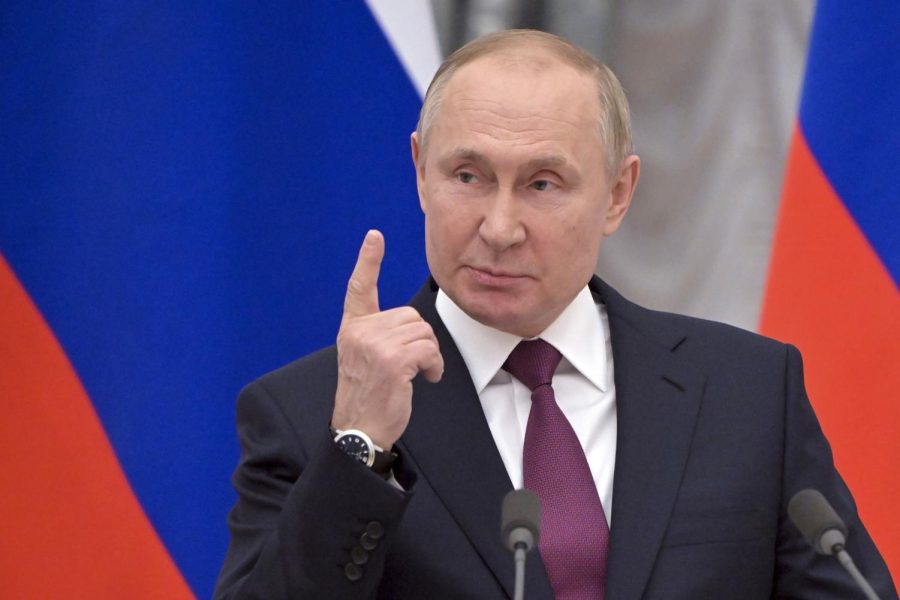From Ukraine to Spotify: lessons learned from the global fight against misinformation
Vladimir Putin worked for the KGB, a Russian spy organization, during the 1970s.
What do eastern Ukraine and Spotify have in common? They were both recently at the center of the global war over information. In the digital age, conflicts previously settled on the battlefield or in a good old-fashioned duel are increasingly waged online and in the media — bullets replaced with bytes.
The fight takes on many faces in many different contexts, but underlying it all is the debate over truth and who gets to decide what is true. With the global ubiquity of the internet, humans generate a dizzying amount of information — over 2 quadrillion bytes daily. In that sea of data, all sorts of false ideas and narratives are bound to spread. And with about 60% of the world regularly on the internet, some of that misinformation is bound to take root.
As the information economy increasingly makes (and remakes) modern, post-industrial society, false beliefs are costlier than ever. Only 76% of Americans have received the COVID-19 vaccine, despite overwhelming evidence that they work. 40% of Americans believe the 2020 election was stolen which — and I cannot emphasize this enough — is delusional.
Debates over domestic misinformation came to a head last week when a number of musicians demanded Spotify remove episodes of Joe Rogan’s podcast which contained inaccurate information about vaccines. Spotify says it has no plans to drop Rogan, although it has stealthily removed some episodes from the archives.
But bad information doesn’t only impact domestic affairs; the information war looms large on the international stage. As Russia lies in wait, surrounding Ukraine with more than 100,000 troops, the information war has already begun. Russian President Vladimir Putin described the situation in eastern Ukraine as “genocide” against ethnic Russians. There is no evidence that anything remotely like genocide is underway in Ukraine and Putin knows that. He is simply trying to shape the narrative and lay the groundwork for a justification should he choose to invade.
On the other side of the Atlantic, the United States has repeatedly publicized intelligence about Russia’s plots. For instance, US officials said publicly that Russia planned to stage a fake attack on its own forces to justify a “counterattack.” One disclaimer — one massive, flashing red, 32-point font asterisk — here: the United States has not been the most credible on high-stakes intelligence like this. I am reminded of the non-existent WMDs that prompted a full-scale invasion and occupation of Iraq.
But the fact that the US released this intelligence publicly is itself an interesting data point in the information conflict. If it is true, publicizing Putin’s plot neutralizes it. A plan reliant on secret operations can no longer function once it runs on the front of The New York Times. If it is not true, it is a similar maneuver to Putin’s “genocide” remarks: an attempt to cast Russia as the aggressors, should war break out.
Oddly enough, I think this “publicize everything” strategy presents a very useful framework for countering all sorts of misinformation, domestic and international.
As New York Times national security reporter David Sanger recently noted, there is a fundamental difference between what America is doing and what Russia is doing (or at least the US claims). While Russia spins lies out of thin air in an attempt to control the narrative, the US is also attempting to control the narrative. But it is doing so in a very different way: by releasing and publicizing useful facts. Again, right now it is impossible to know if the US is telling the truth. But, if they are, they are demonstrating exactly what free society should do to win information wars: unflinchingly and unrelentingly tell the truth.
In an authoritarian country the problem with Joe Rogan would be easily solved: throw him in prison. But in the United States, free speech is sacred — and rightfully so. Free speech is democracy’s strongest card. In an open society, the government’s crimes will always eventually see the light of day, hidden corruption will one day be visible and the best, most creative thinkers will flourish.
In the long run truth will always win out, because truth is self-validating. Lies about non-existent genocide in Ukraine have to be actively fueled or else they’ll eventually fade away. True events run their own information campaigns. If something is actually, really happening, people will talk about it, communicate about it, write about it. Reality has a way of pushing back.
The real problem is in the short run. When people make critical decisions every single day, sometimes truth simply does not have time to rise to the surface. Consistently reliable institutions of truth telling are the best solution we have for these short-run truth problems.
The reason the U.S. assessment is not fully trustworthy is because they have lied about this stuff many times in the past. But if the Russian false flag plot story is true — and given its consistency with past Russian strategy I think it probably is — this represents a great first step in restoring US credibility on these issues.
The solution is the same with the likes of Joe Rogan. Don’t give in to the impulse to shut him down — once you give into that authoritarian impulse you lose credibility. Rather, truth telling institutions like the CDC or prominent medical groups like the American Medical Association or The Cleveland Clinic need to tell the truth loudly, show their work as best as is possible and admit when they were wrong in the past.
As free speech advocate Jacob Mchangama wrote in a wonderful column last week, “Free speech is often a messy and counterintuitive ideal. Sacrificing this abstract principle is tempting” when faced with the real harm unsavory speech can do. But in the end, allowing the nutbags to be nutbags and squarely devoting our institutions to truth telling is the only way out of the information chaos.
TJ Lindstrom is a Junior from Chicago and is the Editor-in-Chief of The Carroll News. He can be reached at tlindstrom23@jcu.edu or @TjTlind on Twitter.








